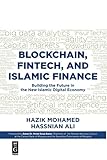Blockchain, Fintech, and Islamic Finance : Building the Future in the New Islamic Digital Economy / Hazik Mohamed, Hassnian Ali.
Material type: TextPublisher: Boston ; Berlin : De|G Press, [2018]Copyright date: ©2019Description: 1 online resource (236 p.)Content type:
TextPublisher: Boston ; Berlin : De|G Press, [2018]Copyright date: ©2019Description: 1 online resource (236 p.)Content type: - 9781547417124
- 9781547400980
- 9781547400966
- online - DeGruyter
| Item type | Current library | Call number | URL | Status | Notes | Barcode | |
|---|---|---|---|---|---|---|---|
 eBook
eBook
|
Biblioteca "Angelicum" Pont. Univ. S.Tommaso d'Aquino Nuvola online | online - DeGruyter (Browse shelf(Opens below)) | Online access | Not for loan (Accesso limitato) | Accesso per gli utenti autorizzati / Access for authorized users | (dgr)9781547400966 |
Browsing Biblioteca "Angelicum" Pont. Univ. S.Tommaso d'Aquino shelves, Shelving location: Nuvola online Close shelf browser (Hides shelf browser)

|

|

|

|

|

|

|
||
| online - DeGruyter Port Business : Second Edition / | online - DeGruyter Fintech : The New DNA of Financial Services / | online - DeGruyter Better Governance Across the Board : Creating Value Through Reputation, People, and Processes / | online - DeGruyter Blockchain, Fintech, and Islamic Finance : Building the Future in the New Islamic Digital Economy / | online - DeGruyter Fintech in a Flash : Financial Technology Made Easy / | online - DeGruyter Practical Trend Analysis : Applying Signals and Indicators to Improve Trade Timing / | online - DeGruyter Making Money : The History and Future of Society's Most Important Technology / |
Frontmatter -- Advance Praise for Blockchain, Fintech, and Islamic Finance -- About DeG PRESS -- Acknowledgments -- Foreword -- Contents -- Preface -- Chapter 1: Introduction -- Chapter 2: Fintech-Definition, History, and Global Landscape -- Chapter 3: Importance of Fintech and Its Applications -- Chapter 4: Emergence of Islamic Fintech and its Developments -- Chapter 5: Blockchain and the Digital Economy -- Chapter 6: Expanded Use Cases of Blockchain -- Chapter 7: Evolution of Blockchain -- Chapter 8: Response of Islamic Financial Institutions -- Index
While creating new forms (Shari'ah-compliant standards) to operationalize Islamic values and ethics into the current conventional economic system and banking products is crucial to sustain the Islamic economy as it is today, we also need to develop new strategies to cope with the next economic evolution. The digital revolution in financial services is under way, and digital disruption has the potential to shrink the role and relevance of today's banks, while simultaneously creating better, faster, cheaper services that will be an essential part of everyday life. This forward-looking book discusses the crucial innovation, structural and institutional development for financial technologies (fintech) in Islamic finance. The authors explain concepts in fintech and blockchain technology and follow through with their applications, challenges and evolving nature. The book provides insights into technology which will enable and enhance actual prescribed Islamic behaviors in modern economic transactions. Case studies highlight how to cope with modern transactional behavior with the advent of global online/mobile markets, shorter attention spans, and impersonal trade exchange.
Mode of access: Internet via World Wide Web.
In English.
Description based on online resource; title from PDF title page (publisher's Web site, viewed 23. Jan 2019)


